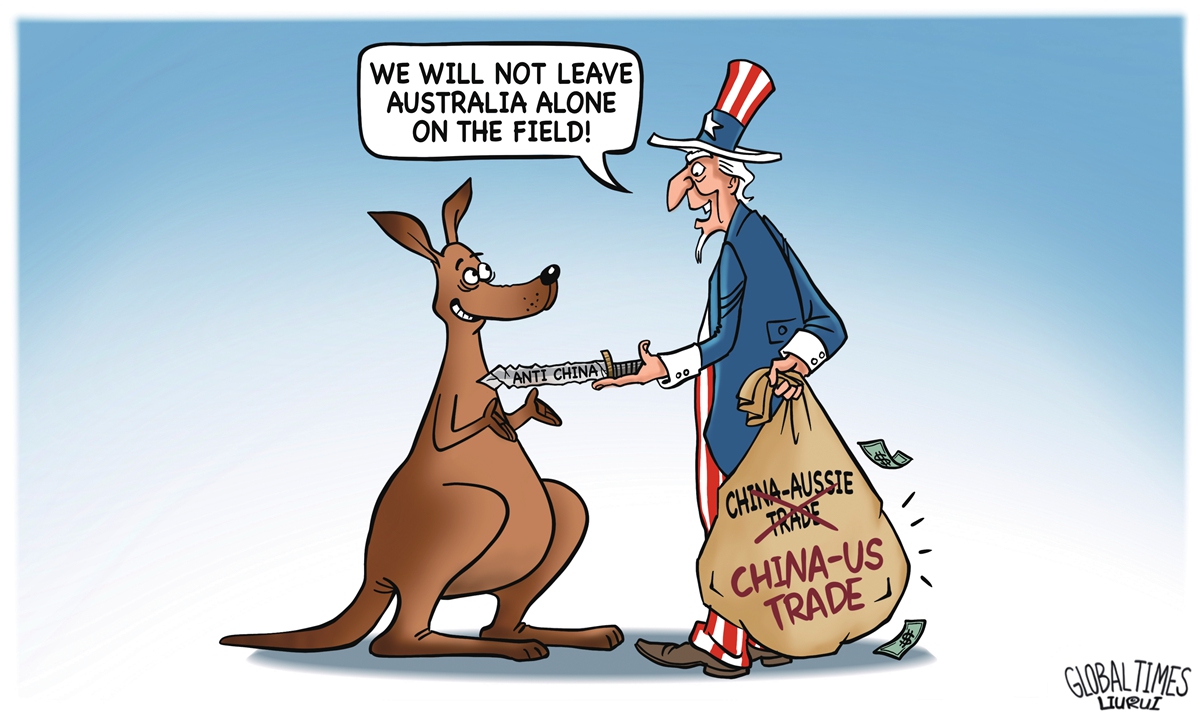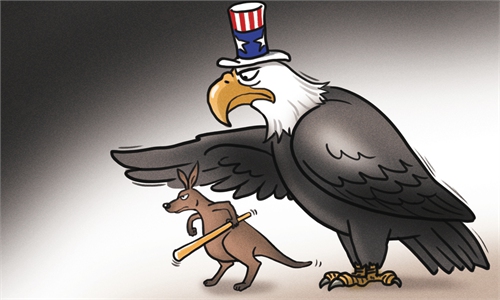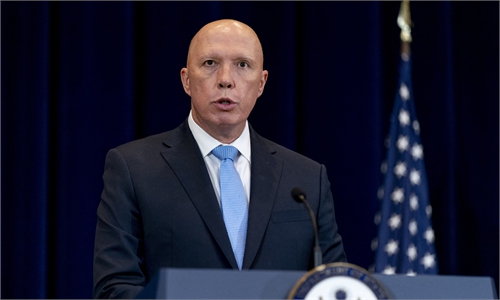US competitors picking up Australia’s lost sales in China frustrates Aussie producers: Australian scholar

Back-stabbing friend Illustration: Liu Rui/GT
Editor's Note:According to a recent report by the Australia-China Relations Institute of the University of Technology Sydney, the value of 12 Australian exports to China affected by China-Australia dispute fell by $17.3billion in the first nine months of this year compared with the 2019 figures. During the same period, the value of US exports of the same commodities increased by $6.3 billion. Australia is serving as an anti-China vanguard for the US, but Washington has become the biggest beneficiary of the China-Australia dispute. Why has Australia chosen this path? Will the Morrison administration adjust its China policy? Global Times (GT) reporters Yu Jincui and Wang Wenwen interviewed James Laurenceson (Laurenceson), director of the Australia-China Relations Institute at the University of Technology Sydney, via email.
GT: In your opinion, how will the Australian business community view those figures? What impact will they have on Australia's future diplomacy with the US and China?
Laurenceson: The figures won't surprise business leaders in the slightest. Indeed, they've been foreshadowing this as an entirely predictable outcome for more than a year, as have academics like myself. But this is not to say that business leaders will lobby the Australian government to make substantive changes to its foreign policy. They won't. What they are wanting is an honest assessment by Canberra of the costs and recognition by the government of who is bearing these costs - Australian businesses and Australian businesses alone. And for Canberra to think harder about how they might be better supported.
For Australian producers, watching American competitors pick up their lost sales in China, hearing the Morrison administration repeat ad nauseam the line that the US stands "shoulder to shoulder" with Australia is a frustrating experience. It must also be said that many Australian businesses are very disappointed by Beijing. After investing years of goodwill and resources into building relationships with China, they found these efforts were undone not by any mistakes they themselves made or because Chinese importers no longer wanted their goods, but rather by the political dispute between Beijing and Canberra. Sadly, this experience will linger in the minds of Australian businesses for a long time to come. In my view, the Morrison administration's diplomatic approach toward China is locked in. Some reasonable public policy moves in the past, like banning foreign political donations and tightening up foreign interference laws, are now being overlayed with rhetoric and interventions that are firmly focused on domestic politics and amplifying threat perceptions of China among the general public. The good news is that this bald political strategy is fairly widely recognized. This isn't to say that China doesn't present genuine challenges to Australia's interests. Rather, the productive way to respond isn't the way being adopted. Meanwhile, there's little evidence of a course correction in Beijing either, making it easy for China hawks in Australia to claim they were right about China all along. As usual, it's individuals and businesses in Australia and China that are suffering from the political fallout.
GT: There is a view on media recently saying that the economic losses that a worsening China-Australia relationship has brought to Australia are much smaller than many have assumed and Australia's resilience suggests that decoupling from China won't bring serious consequences. How do you view this point?
Laurenceson: It's certainly true that I think Beijing miscalculated the costs to Australia of hitting goods like coal and barley. Global markets have simply redirected Australia's commodities exports elsewhere. But there are three problems with the line that a trade decoupling from China won't hurt.
First, at an aggregate level, two-way trade between Australia and China is at a record high. There hasn't been any decoupling. This is because China continues to buy big-ticket Australian exports like iron ore, as well as extremely high global iron ore prices. But of course, over time this can change. Second, it ignores the serious costs to specific sectors, like wine. There is no global market that can easily redirect a high value-added, differentiated good like wine. As a result, the massive fall in wine sales to China has meant a large drop in exports overall. Third, future costs can rise for many reasons. For example, trade disruption could spread to services or the Chinese market could continue to outperform alternative markets that Australian exporters still have access to.
One final comment is that I don't think the economic costs are actually the biggest cost. The fact is that at the moment Australia does not have a functioning high-level political relationship with the region's dominant power. This makes advancing not only Australian prosperity difficult but other objectives such as around national security too.
GT: Recently, Western Australia and Victoria have both parted ways with the Australian federal government in seeking to rebuild trade ties with China. Why do you think they made such a decision?
Laurenceson: State governments, as is their constitutional responsibility, are focused on local jobs and service delivery such as education and health. The prosperity brought about by trade and investment supports that. Of course, they don't run foreign policy and everyone understands that. But the idea that states ought to utterly align themselves with the federal government on attitudes and approaches to China is, in my view, deeply flawed. This is particularly the case when the federal government is taking such a contentious approach to managing China relations. Having some diverse perspectives within the country is a strength of the Australian system, not a weakness.
GT: You once wrote, "By standing up to China, Australia may end up standing alone." Many countries are facing a situation that they rely on China for economy and the US for security, but they have been able to strike a balance. Why can't Australia do so? Is it because of the Morrison administration or other reasons? Who has benefited the most in Australia by making the country tilt more toward the US?
Laurenceson: Since 2016, the national security establishment has come to dominate Canberra's thinking about China. China's own rhetoric and actions have fed into that, creating this toxic feedback loop. Still, I would also argue there was a major shift in the Morrison administration's approach in early 2020. Prior to then there was still an opportunity for well-crafted diplomacy on both sides to create low-cost off-ramps. In 2019, for example, Morrison rejected viewing the rise of China through the lens of ideological difference. But by this year he was embracing that precise framing.
GT: After Chinese President Xi Jinping and US President Joe Biden had a virtual meeting on November 15, China-US relations have begun to ease to some extent. While at the same time, Morrison's approval ratings fell. In such a context, will Morrison ease his tone toward China? Or will being tough on China still be regarded as a "trump card" for his reelection?
Laurenceson: I think the rhetoric that is now coming from Morrison and Defense Minister Peter Dutton makes it clear that they see talking up the China threat as a useful domestic political strategy. Whether this judgment will prove correct remains to be seen. Generally speaking, foreign policy issues don't tend to decide Australian elections. And drawing foreign relationships into cheap, domestic political point-scoring is unhelpful for longer-term national interests. Still, if they feel they are facing an election loss, it is possible that the Morrison administration will draw on whatever tools it thinks might help avert that outcome.
GT: Economy is one of the topics that concern voters the most. With the general election scheduled in May 2022, to what extent will the consequences that the chilly China-Australia relations have brought about, such as the decline in trade volume and decreasing number of foreign students, affect the election?
Laurenceson: The economic effects of disrupted trade ties with China won't feature much in the election campaigning because overall trade values have, in fact, increased. There might be a negative impact in some localities that have been hit hard, like wine-producing regions. But these will be peripheral to issues that resonate across the country as a whole.


